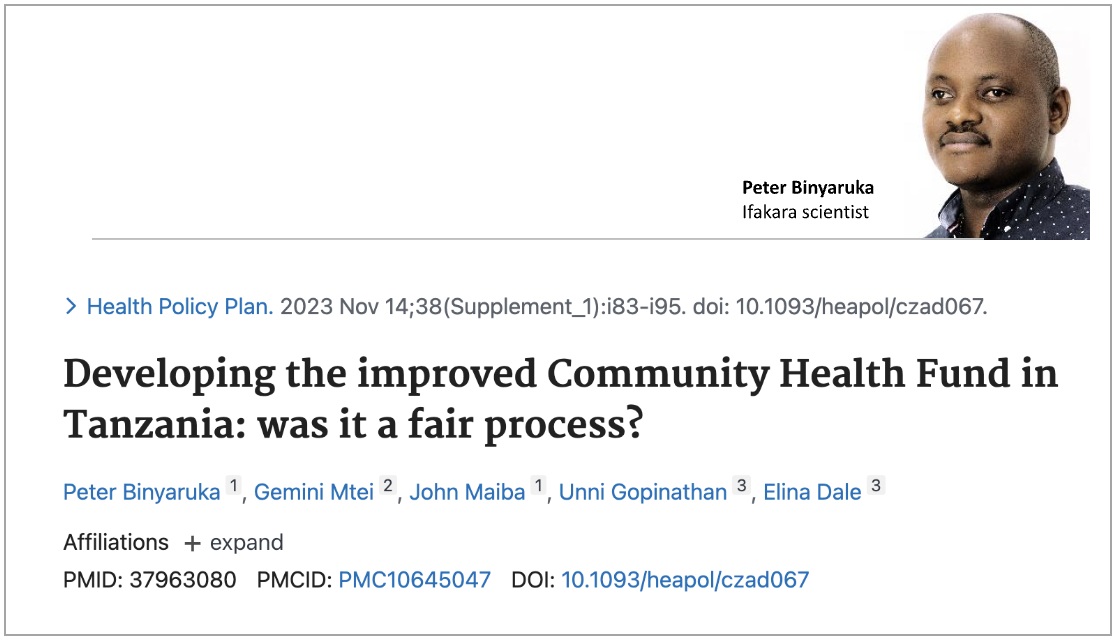
POLICY: Scientists for inclusive decision-making in health financing

A recent study led by Dr. Peter Binyaruka, a senior research scientist and health economist at Ifakara Health Institute, has underlined public participation in policy design and reforms to ensure equitable and effective health systems while also strengthening public trust.
Tanzania, like many nations, grapples with the challenge of inequalities in the access to healthcare, particularly for marginalized groups. To address this, Tanzanian developed its 2016-26 health financing strategy. The strategy suggested the introduction of mandatory national health insurance, which requires long-term legal, inter-ministerial and parliamentary procedures.
In 2017/18, the improved Community Health Fund (iCHF) was introduced to make short-term improvements in coverage especially for ”non-salaried workers (mainly working in the informal sector)” according to the study.
The iCHF reforms, despite their swift development, demonstrated some positive aspects, however, they also showed a lack of inclusivity in the decision-making process, which raised concerns; notes Dr. Binyaruka, who in this study worked in collaboration with scientists from his own Ifakara research team and two partners: the USAID Public Sector Systems Strengthening Plus (PS3+) Project, Tanzania and the Norwegian Institute of Public Health, Norway.
The scientists highlight, “no inputs were sought from citizens in the design of iCHF” they suggest that the exclusion of beneficiaries and providers coupled with limited opportunities for broad representation of views limited inclusivity.
They further hint at the partial transparency of the reform stating, “other stakeholders, including the larger public, intended beneficiaries of the reform (i.e. those in the informal sector), and providers did not have access to information about iCHF discussions.”
The study also reveals that political considerations and power dynamics influenced certain decisions, leading to unequal power distribution among stakeholders in decision making around iCHF reform.
The decision to assign oversight to the President's Office, Regional Administration and Local Government Tanzania (PO-RALG) instead of the National Health Insurance Fund (NHIF), despite evidence supporting reduced administrative costs under NHIF, highlights the impact of power imbalances on decision-making, further fueling the lack of trust in the process.
How to consider fairness
The scientists used the Norwegian Institute of Public Health (NIPH), the World Bank and Bergen Centre for Ethics and Priority Setting (BCEPS) - framework, explained in the report "Open and Inclusive: Fair Processes for Financing Universal Health Coverage '' (World Bank, 2023) to assess whether the decision-making for iCHF was fair.
The framework describes a fair process as considering three parts; information, voice, and oversight—laying out seven key fairness criteria.
For information, decision-makers should give reasons, be clear about how and why decisions are made, and use accurate information. The voice part refers to letting the public have a say and including different perspectives. Lastly, oversight involves being open to change based on new information and making sure rules are followed.
The scientists advocate for upholding the procedural fairness framework to ensure the fairness of decision-making processes, even for short-term policy reforms.
Low participation, low uptake
These shortcomings in the designing phase to some extent contributed to the current low uptake, citing the iCHF's limited coverage of 6%. However, the overall coverage of health insurance is still low at 15.3% of total population for 2020/21. To enhance policy reform uptake, scientists argue for a more participatory process.
The lack of wider public consultations during the design phase may have hindered the scheme's alignment with the public's expectations. The scientists note that "a more participatory process would have resulted in a scheme that would attract more beneficiaries."
The study concludes that while the iCHF provided a partial solution to health financing fragmentation by reducing the number of pools from districts to regions, scientists suggest that “To improve the uptake of a policy reform, the policy design process may need to better and more consistently incorporate voices of its potential beneficiaries.”
The scientists emphasize that procedural fairness enhances the likelihood of fair policy outcomes and ensures the consideration of diverse interests, ultimately fostering trust and support from the public.
Universal Health Coverage (UHC)
The Tanzania Health Policy of 2007 has a vision ‘to improve the health and well-being of all citizens particularly for those most at risk….’ which aligns with the Sustainable Development Goals especially for promoting healthy lives and well-being for all (Goal 3) and achieving UHC.
As Tanzania continues its efforts, a renewed focus on procedural fairness in policy design will contribute to more equitable and effective health systems, ensuring the consideration of diverse interests and fostering public trust and support.
This study was led by Dr. Binyaruka with contributions from Gemini Mtei of the United States Agency for International Development (USAID) Public Sector Systems Strengthening Plus (PS3+) Project; John Maiba of Ifakara; and Unni Gopinathan and Elina Dale all affiliated to the Norwegian Institute of Public Health.
>> Read the full publication, here.
